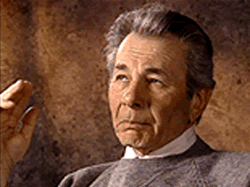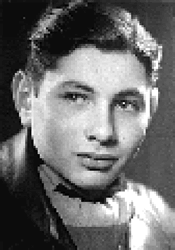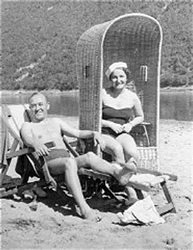Lvov During the Holocaust
From; http://www.ushmm.org/wlc/en/article.php?ModuleId=10005171
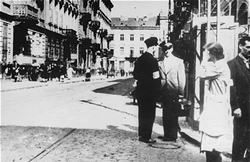
Street scene following the German occupation of the city of Lvov. Lvov, Poland, June 1941.
— US Holocaust Memorial Museum
•
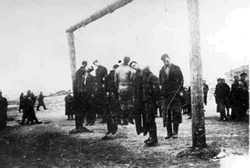
Members of the Lvov Jewish council are hanged by the Germans. Lvov, Poland, September 1942.
— US Holocaust Memorial Museum
•
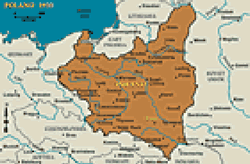
• View Historical Film Footage
• http://www.ushmm.org/wlc/en/media_fi.php?ModuleId=10005171&MediaId=211
• The Soviet Union occupied Lvov in September 1939, according to secret provisions of the German-Soviet Pact. Germany invaded the Soviet Union on June 22, 1941. After a week of bitter fighting, German forces occupied Lvov. They discovered that the Soviet Secret Police had massacred thousands of prisoners, mostly Ukrainian nationalists, before fleeing from the city. This footage shows the removal of the bodies of some of those massacred. The Germans claimed that the city's Jewish population had supported the Soviets and had taken part in the executions. In the pogroms that followed the discovery, Ukrainian partisans supported by German authorities killed about 4,000 Jews in Lvov.
• http://www.ushmm.org/wlc/en/media_fi.php?ModuleId=10005171&MediaId=207
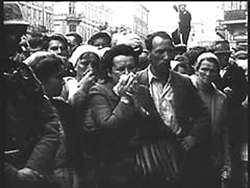
The city of Lvov (L'viv) in southeastern Poland was occupied by the Soviet Union in 1939, under the terms of the German-Soviet Pact. There were over 200,000 Jews in Lvov in September 1939; nearly 100,000 were Jewish refugees from German-occupied Poland. The Germans subsequently occupied Lvov after the invasion of the Soviet Union in June 1941
Encouraged by German forces to begin violent actions against the Jewish population in Lvov, Ukrainian nationalists massacred about 4,000 Jews in early July 1941. Another pogrom, known as the Petliura Days, was organized in late July. This pogrom was named for Simon Petliura, who had organized anti-Jewish pogroms in the Ukraine after World War I. For three days, Ukrainian militants went on a rampage through the Jewish districts of Lvov. They took groups of Jews to the Jewish cemetery and to Lunecki prison and shot them. More than 2,000 Jews were murdered and thousands more were injured.
In early November 1941, the Germans established a ghetto in the north of Lvov. German police shot thousands of elderly and sick Jews as they crossed the bridge on Peltewna Street on their way to the ghetto. In March 1942, the Germans began deporting Jews from the ghetto to the Belzec extermination camp.
By August 1942, more than 65,000 Jews had been deported from the Lvov ghetto and murdered. Thousands of Jews were sent for forced labor to the nearby Janowska camp. In early June 1943, the Germans destroyed the ghetto, killing thousands of Jews in the process. The remaining ghetto residents were sent to the Janowska forced-labor camp or deported to Belze
Lvov — ID Card/Oral History
Back to Article
• 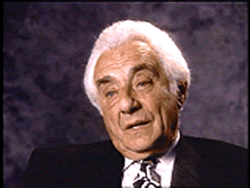
Felix Horn
Born: 1920
Lublin, Poland
Describes antisemitism in Lvov, and conditions in the Janowska camp
• Felix was born to an assimilated Jewish family in Lublin, Poland. His father was a locksmith and his mother was a singer. Following the German invasion of Poland on September 1, 1939, Felix fled east to Rovno and then to Soviet-occupied Lvov, where he was accepted at a medical school. After the German invasion of the Soviet Union in June 1941, Felix was taken to a labor camp. He escaped and returned to Lublin, and found that his family had been forced into the ghetto established there. After the liquidation of the Lublin ghetto, Felix, his sister, and his future wife Lucine were sent to the Majdan Tatarski ghetto. Felix, Lucine, and her brother escaped and hid, eventually fleeing to the Warsaw ghetto, where Felix and Lucine were married. They escaped to the "Aryan" side of Warsaw and obtained false papers. Felix worked for the underground during the Warsaw Polish uprising in 1944. He and Lucine were liberated by Soviet forces in January 1945. They immigrated to the United States in October 1950.
Transcript
http://www.ushmm.org/wlc/en/media_oi.php?ModuleId=10005171&MediaId=1130
Germany, in spite of, in spite of their pact with the Soviet Russia, they invaded eastern Poland. And first thing what happened, Ukrainian students in the dormitory knew who was the Jewish, who was the Jewish student. They grabbed me, one of my good friends, Ukrainian, grabbed me, beating the hell out of me, forced me to scrub the floor of a pub that he opened up for German officers. From then, I was taken to a labor camp on Janowska Street in Lvov. Was not a concentration camp, it was a labor camp, but the way they treated us was just like concentration camp. We're lying on wooden boxes really, not in beds, boxes, there was nothing to eat, and we had to be on Appell [roll call] at 5 a.m. wintertime. We didn't stand straight, they beat you, they'd kick you from the front, from the back, from the side. You couldn't go down 'cause they would shoot you. So the, the, the awareness of not to go down, all the bleeding, always kept me aware of it, to stand up, and I was numb for after a while I didn't feel the beating, even. And then maybe 7 a.m. or so we're marching to the city to work. And after a few days I thought, Well there's nothing to expect. I run away. And, where are you going to go? I'll run away to the dormitory. That's the only place I knew. Here I found three of my colleagues, Jewish students, hiding in the basement. How they escaped I don't know, because they went through the building very thoroughly, usually the Ukrainian police with the Germans. We decided to go eastward.
Wilek (William) Loew
http://www.ushmm.org/wlc/en/media_oi.php?ModuleId=10005171&MediaId=1230
• Born: 1925
Lvov, Poland
• was the son of Jewish parents living in the southeastern Polish town of Lvov. His family owned and operated a winery that had been in family hands since 1870. Wilek's father died of a heart attack in 1929. Wilek entered secondary school in 1939. Soon after he began school, World War II began with the German invasion of Poland. Lvov was in the part of eastern Poland annexed by the Soviet Union. Although the Soviets took over Wilek's home and the family business, Wilek was able to continue his schooling. On June 22, 1941, German forces invaded the Soviet Union. The Germans occupied Lvov and established a ghetto there. Wilek was among a small group of Jews who left the ghetto daily to work. making roofing paper for the German army. In 1943, shortly before the Germans destroyed the Lvov ghetto, Wilek obtained false papers, assumed the name of a Christian coworker, and fled to Hungary. He became a courier for the resistance in Budapest and was eventually arrested by the Germans as a Polish spy. He was sent to the Auschwitz camp in October 1944. Wilek was among thousands of prisoners sent on a death march to the German interior as Allied forces advanced. He was liberated by US forces in April 1945, and immigrated to the United States in 1949.
Describes the hiding place in which his mother survived an Aktion in Lvov
Oral History
Describes the hiding place in which his mother survived an Aktion in Lvov [Interview: 1995]
— US Holocaust Memorial Museum - Collections
Transcript
But I got in, into, into, into the ghetto because I wanted to see what happened to my mother. I rushed in into the house. The house was empty, but the hiding place where we had a hiding place for my mother was a couch. A couch consisted of a frame and on top of the frame there was this soft part which is the couch. And you couldn't tell whether that couch, uh, was separate. For, for anyone else it was one part, the frame and the couch, the upper part, was one unit. That's why when there was any Aktion, my mother will be hiding over there. I will make sure of that. When I got home, the upper part was moved, so I was scared of that. And when I cried out for my mother, she came to life, she was there. She was on the end side of the couch, so even it was moved, she was in that area. She was wrapped around in a blanket, dark blanket. So even they were looking for her, they didn't find her. She was there, so she, we had our moments.
•
Describes roundup of Jews during August 1942 deportation from Lvov to Belzec
Oral History
• Describes roundup of Jews during August 1942 deportation from Lvov to Belzec [Interview: 1995]
— US Holocaust Memorial Museum - Collections
Transcript
Pappapol was located on Drokevska [ph] Street. The main entrance was from Drokevska Street, which was the main thorough between north and south. And it was the area which, within couple blocks where my home used to be, couple blocks from my uncle's used to be, and so on. There was a time that I recall that was that akcya [Aktion/action] came about, was the shayni [second] ghetto and it was close to evening. And somebody rushed in into the factory, one of our workers. "They're moving them now through the street." We moved out. I moved out immediately to, to the gate to see what we wanted to see. And we, that's what we didn't want to see, thousands and thousands and thousands of ghetto people were moving, going, going to Drokevska Street. And I looked and I saw some of my friends. My friends, dear friends, that I used to play with. Uh, some acquaintances. I was looking for my mother. I didn't see her, didn't find her. It was maybe 20 rows, and with, and miles of people. They were slowly marching. They were guarded by, by Ukrainian militia. I didn't see any Germans. Maybe in the back, but I didn't see them. Mostly Ukrainian on each side. I didn't see the front either. I came right in the middle. I didn't see the, the, the beginning of the march, I didn't see the end of the march. I just kept on seeing the area where, where it was visible to me from that narrow gate. We were not, I didn't, they didn't see me, I saw them, because the gate was actually locked, the Pappapol, uh, gate. And it was going on for hours and hours because there was a slow march. Finally it ended. People were looking from the windows, uh, because that whole Drokevska was all inhabited by Ukrainians and Poles, second, third stories, they're all look at them. It was a very grim sight. http://www.ushmm.org/wlc/en/media_oi.php?ModuleId=10005171&MediaId=1229
Wilek Loew
Born: October 29, 1925
Lvov, Poland
ID Card
• Wilek was the son of Jewish parents living in Lvov, a large city in southeastern Poland. His family owned and operated a honeywine winery. Although they lived amongst Poles and Ukrainians, Wilek's family spoke Hebrew, German and Polish at home and were among Lvov's Jewish intelligentsia. When Wilek was 4, his father died of a heart attack.
1933-39: Jews were often discriminated against in Poland. We found it hard to gain access to schools and jobs. In 1939 I managed to pass the entrance exam and entered the Lvov secondary school. Soon after I began school, war broke out; the Soviets and Germans divided Poland. The Soviets annexed Lvov, taking over our home and business. However, Soviet rule spared us from the Nazis' brutality. I continued my schooling.
1940-44: The German army seized Lvov in 1941, moving the Jews into a ghetto. I was among 40 who crossed daily to the Polish side to make roofing paper for the German army; this work saved me from deportation. In 1943, just before the Germans destroyed the ghetto, I got false papers, assumed the name of a Christian coworker, and fled to Hungary. I became a courier for the resistance in Budapest and was arrested as a Polish spy. Unaware of my Jewish identity, they sent me to Auschwitz on October 29, 1944. It was my 19th birthday.
Among thousands of prisoners force-marched to the German interior as the Allies advanced, Wilek was liberated by the Americans on April 23, 1945. In 1949 he emigrated to America.
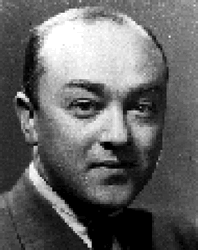
Daniel Schwarzwald
Born: November 1, 1901
Byelts, Poland
ID Card
Daniel, usually known as Danek, was one of three children born to Raphael and Amalia Schwarzwald, a Jewish couple living in a village near Lvov. When he was a young boy, his family moved to Lvov, where he went on to attend secondary school and a business college. Daniel opened a lumber export business. He traveled extensively and could speak Polish, German, Russian, Yiddish and English.
1933-39: Business prospered and in 1935 Daniel married Laura Litwak and settled in an apartment in a Christian section of Lvov. But war loomed and industrial Lvov was coveted by both the Germans and Soviets. Daniel wanted to emigrate to Britain, where he had business contacts. But his wife, who was pregnant, did not want to abandon her parents. In September 1939 the Soviets occupied Lvov and Daniel's business was expropriated.
1940-42: After the Germans occupied Lvov in 1941, the Schwarzwalds were forced into the Lvov ghetto. With his remaining money Daniel bought false "Polish Catholic" ID cards for his family. Polish friends promised to help them in case anything happened to him. One day, while he was at the Jewish council offices, soldiers surrounded the building and ordered everyone out--someone had killed a drunken German. People were shot as they left, so Daniel tried to save himself by jumping from a window.
As Daniel jumped from the window that Tuesday, September 1, 1942, he was shot by the Germans. He was 41 years old.
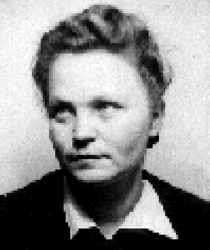
Adela Litwak
Born: April 15, 1920
Lvov, Poland
ID Card
•
Adela was the youngest of five children born to religious Jewish parents in the industrial city of Lvov. Often known by her nickname, Putzi, she grew up in the same building as her paternal grandparents and learned to speak Polish, German and Yiddish. She attended public and private schools in Lvov before graduating from a Polish secondary school.
1933-39: My dream was to go on to medical school. But the tiny Jewish quota at colleges and universities virtually excluded me from enrolling. By September 1939 there were worse problems than not being able to attend university. The Germans invaded Poland from the west, and the Soviets came from the east and occupied Lvov in late September. Though instituting communism, Soviet rule at least spared us from German occupation.
1940-44: After the Germans occupied Lvov in July 1941, I avoided German roundups and deportation. My brother-in-law bought me a false ID card from a Pole. Becoming Ksenia Osoba, a Polish Catholic, I left Lvov in September 1942 and found work in Krakow as a secretary and governess. Working conditions were not too bad, but I was in constant fear of being discovered. On the trolley one day I met a former classmate of mine. I froze. Rather than talk to her I got off immediately. I didn't know if she would give me away.
Adela kept her false identity until she emigrated to England after the war. She married another Holocaust survivor. Together they moved to Canada and then to the United States.
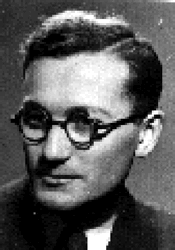
Emanuel Litwak
Born: May 3, 1913
Lvov, Poland
•
Emanuel, often known by his nickname Manek, was one of five children born to religious Jewish parents in the industrial city of Lvov. After graduating from secondary school, he entered Lvov's polytechnic institute to study civil engineering.
1933-39: At the institute the Jewish students had to stand on the left side of the lecture hall. Once, antisemitic schoolmates broke his jaw because he put up a fight when he was insulted. Manek sued his attackers, but the case was dismissed; the judge said Manek should have been happy he had not been killed. Manek graduated in 1939. After the Soviets occupied Lvov that September, Manek became a planning engineer for the railroad.
1940-42: The Germans took Lvov from the Soviets in 1941. A family friend, Julek, who had been entrusted to help the Litwaks, was asked to ship some clothes to Manek's sister and niece living as "Polish Catholics" in a town 100 miles away. Suspiciously, the clothes never arrived. When Manek decided in September 1942 to flee Lvov to live where no one knew him, Julek came with him to the train station. On the way, Manek wondered whether he could trust Julek.
Manek was betrayed, and was arrested at the Lvov train station for not wearing the required Jewish badge. He was summarily hanged by the Germans. Manek was 29.
•
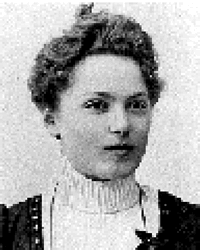
Mina Schaerf Litwak
Born: January 6, 1883
Vinnitsa,
Mina was the daughter of Chaim and Scheindel Schaerf. They lived in the multi-ethnic town of Vinnitsa. Mina came from a religious Jewish family. At 19 she married Josef Litwak, a banker from the nearby town of Dolina, Poland. The couple settled in the industrial city of Lvov, where they raised five children. Four languages were spoken in their household--Polish, Russian, German and Yiddish.
1933-39: The Litwak's two youngest children, Fryda and Adela, had finished secondary school and were planning to attend university, but were unable to because the Polish government was enforcing quotas limiting Jewish admissions to universities. On September 1, 1939, the Germans invaded Poland from the west, and the Soviets invaded from the east 16 days later, splitting the country in two. Lvov was in the Soviet sector.
1940-42: On June 30, 1941, eight days after Germany invaded the Soviet Union, German forces occupied Lvov. Towards the end of the year, most of Lvov's Jews were concentrated in a Jewish ghetto. Food in the ghetto was scarce, and the population was subjected to repeated roundups and deportations. In late August 1942, during the biggest deportation roundup in the ghetto, the Germans came for Mina. Her husband insisted on going with her.
Mina and her husband were put on a transport to the Belzec extermination camp, where she perished in August 1942. She was 59 years old.
• Selma Schwarzwald and her bear, "Refugee"
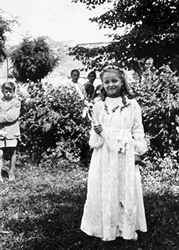
Selma Schwarzwald poses outside while wearing her first communion dress. Selma lived in hiding as a Polish Catholic during the war. Busko-Zdroj, Poland, 1945.
— USHMM, courtesy of Sophie Turner-Zaretsky (Selma Schwarzwald)
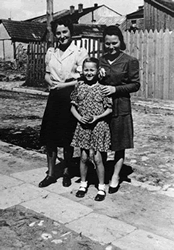
Laura Schwarzwald, her daughter Selma, and Laura's sister, Adela Litwak, in Busko-Zdroj. Poland, 1945.
— USHMM, courtesy of Sophie Turner-Zaretsky (Selma Schwarzwald)
At some point after the war, Sophie received this small stuffed bear (about three inches high) as a present from her mother. She named it “Refugee,” just like she and her mother were refugees of the war.
— USHMM, courtesy of Sophie Turner-Zaretsky (Selma Schwarzwald)
Sophie's parents, Daniel and Laura Schwarzwald, pictured on a beach in Zaleszczyki, Poland, shortly after they were married. Poland, 1935.
— USHMM, courtesy of Sophie Turner-Zaretsky (Selma Schwarzwald)
•
SOPHIE WAS BORN SELMA
How can life change so terribly?
Sophie Turner-Zaretsky was born Selma Schwarzwald in Lvov (Lwow, L'viv), Poland, on September 2, 1937. Her father, Daniel, was a successful businessman who exported timber and her mother, Laura, had studied economics.
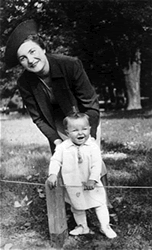
Selma Schwarzwald with her mother, Laura, in Lvov, Poland, September 1938.
— USHMM, courtesy of Sophie Turner-Zaretsky (Selma Schwarzwald)
• On June 30, 1941 everything began to change for Sophie's family—the Germans entered Lvov and the repression and killing of Jews began immediately. Daniel had a job as a guard and his work permit gave the family temporary safety, but in November the Germans started to move all Jews into a ghetto.
Sophie's entire family was forced into the ghetto: her grandparents Josef and Mina Litwak, her aunts Adela and Fryda, and her uncle Emanuel. The family watched as thousands of Jews were murdered or sent for forced labor to the nearby Janowska camp and, later, in 1942, were deported from the ghetto to the Belzec extermination camp. Every day the family grew more and more scared. In August 1942 Sophie's grandparents were rounded up and deported to Belzec where they later died.
HIDING AND ESCAPE
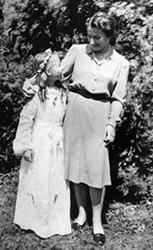
Selma Schwarzwald and her mother, Laura, in Busko-Zdroj on the occasion of Selma's first communion in 1945. Selma and Laura lived under false identities. Sophie had gradually forgotten that she was Jewish and did not learn of her Jewish identity until after the war. Busko-Zdroj, Poland, 1945.
— USHMM, courtesy of Sophie Turner-Zaretsky (Selma Schwarzwald)
How do you stay alive and escape?
Daniel tried to buy false documents for Laura and Sophie. The SS were getting close and roundups of Jews for deportation were happening frequently so Laura and Sophie went into hiding for a few days. The hiding place was a platform under the roof of an adjacent house. Laura had to throw Sophie across an airshaft to someone who would catch her on the other side and then Laura would jump across from one window to the next.
Daniel finally managed to get false papers for his wife and daughter and insisted they make plans to leave. On September 1, 1942, he went to the Jewish Council for help in finding a new place to live but that same day the council was blamed for the death of a German soldier. Daniel tried to escape as the Germans surrounded the building but he was shot and killed. To this day Sophie remembers the night her father didn't come home. Five days after Daniel was killed Laura and Sophie escaped from the ghetto on a train and made it to Krakow.
SOPHIE AND HER MOTHER MAKE A NEW LIFE
What is it like to become a different person?
Sophie was five years old when she and her mother made a new life for themselves in the autumn of 1942. Sophie's mother constantly changed their address in the city, afraid the SS would catch up with them. When she looked for work Laura had to leave Sophie with an old woman who made Sophie pick up cigarette stubs in the street.
Laura decided to act on the advice of her old Christian landlady in Lvov to find a job in a resort town where it would be easier to assume new identities and where the local population was used to seeing strangers. Laura had a Christian bible and prayer book the landlady gave her. Laura placed an ad for a job outside Krakow (Cracow) and in a strange twist of fate an officer in the SS answered her ad and helped save Sophie and her mother. They moved again and Laura became a translator and housekeeper for the officer in the town of Busko Zdroj.
Sophie—now Zofia Tymejko—was confused about what to tell people. Her mother drilled it in to her that her father was taken by the Russians. Sophie had blonde hair and light eyes so few suspected she might be Jewish.
Joined by Adela, Laura's sister (Sophie's maternal aunt) in December 1944, the family remained together until their liberation in the spring of 1945. While in hiding and immediately following liberation, Sophie gradually forgot that she was Jewish and adopted the Catholic faith and celebrated her first communion shortly after liberation in 1945.
THE TEDDY BEAR
Who will comfort you?
At some point after the war, Sophie received a small stuffed bear as a birthday or Christmas present from her mother. The bear had moving arms and legs and was about three inches high. Sophie's aunt Adela crocheted a coat for the bear. Sophie thought the honey brown bear with eyes that were askew looked “a little down and out.” She later named it “Refugee,” just like she and her mother were refugees of the war. The little bear would be by her side for decades.
SOPHIE LEARNS HER REAL IDENTITY
How do you start over again?
In 1946 Laura contacted her aunt in London and her uncle in New York who then helped Laura and Sophie leave Poland. When they arrived in London in 1948, Laura told Sophie she was Jewish. Sophie could not believe it and suffered a breakdown. For years she had learned to hate Jews.
Despite the shock, Sophie learned to listen, observe, and fit in. She didn't know the local customs or the language but she applied herself academically, even in Hebrew school. Sophie's mother changed their last name to Turner and Sophie attended college and later medical school. In 1963 she went to stay with relatives in the United States and complete her medical residency. Sophie slowly became more comfortable with being Jewish.
Sophie wanted to marry an American Jew and in 1970 she married David Zaretsky. They had two sons. Sophie Turner-Zaretsky is still a practicing radiation oncologist in New York.
SAVING THE BEAR
How do you remember?
For over 50 years Sophie held on to the bear that she had received as a little girl. It was with her when she was Zofia, a Catholic in Poland; it was with her when she grew up in England; and it was with her when she moved to the United States to begin a new life yet again. The bear was a silent witness to the miracle of Sophie's rescue, rebirth, and success.
ON THE SPACE SHUTTLE DISCOVERY
A timely reminder of history’s relevance
In December 2006, Space Shuttle Discovery Commander Mark Polansky took a replica of "Refugee" with him on the shuttle's mission. Each astronaut is invited to take a few items into space. Polansky took the replica of "Refugee" and an image of a Darfurian child in a refugee camp in Chad taken by Museum staff member Jerry Fowler.
Commander Mark Polansky visited the United States Holocaust Memorial Museum on February 27, 2007, to meet Sophie Turner-Zaretsky. He presented the replica of the bear and the photo—along with NASA space travel certificates—to Museum chief of staff Bill Parsons, who said the Museum wanted to provide something that would be a timely reminder of history’s relevance. "Although we can send people into space, we still can’t seem to stop them from hating and killing one another. A child’s stuffed toy from the Holocaust and a photograph of a refugee from the genocide today in Darfur remind us the lessons of the Holocaust have yet to be learned."
